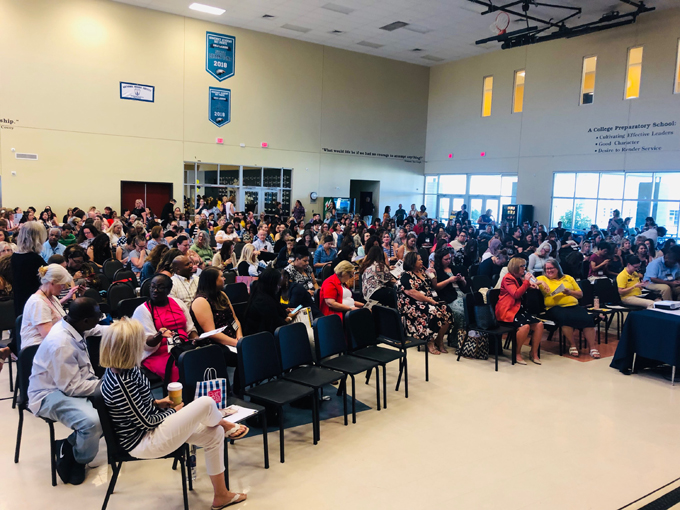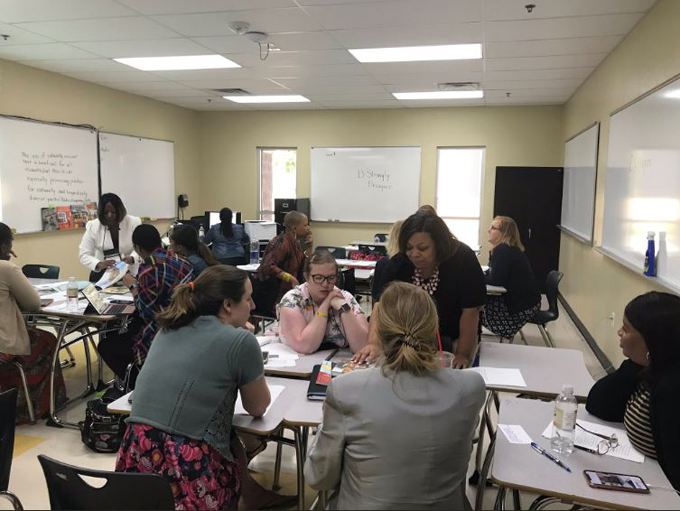 When was your lightbulb moment?
When was your lightbulb moment?
That was one of the first questions opening keynote speaker Sharroky Hollie asked the crowd of 500+ educators at ILA Intensive: Nevada last Friday, June 21.
Hollie, an educator renowned for professional development on cultural responsiveness, wanted to know the moment they realized that schools were not set up to serve students equally, that they still were not even close to equity for all.
The volume of voices rose exponentially in the high school student center of Somerset Academy-SkyPointe Campus, the host site for the event held June 21–22 in Las Vegas, NV. The attendees discussed their answers with each other after Hollie shared that for him, it was when he was a middle school teacher in Los Angeles in 1992—the year of the Rodney King riots.
“You cannot do the work of equity if you have not had your lightbulb moment,” Hollie stressed as the conversation came back around. “One of the reasons why we’re stagnating, why we’re still talking about this after all this time, is because we have not had a collective lightbulb moment. We have not collectively said that all students are not educated equitably and our plan A is not going to work. We need a plan B.”
His message summed up the impetus for ILA Intensive: Nevada. Focused on the theme of Equity and Access to Literacy, the Intensive was for educators looking for a network of like-minded peers and resources geared toward confronting systemic issues and improving outcomes for all students.
In short, it was for educators looking to enact what Hollie referred to as plan B.
He kicked off the two-day event by confronting the issues head-on: The work of responsiveness, he said, isn’t simply about “not being racist.” It’s about constantly reexamining our biases about a multitude of differences. As such, it’s not unexpected to have multiple lightbulb moments throughout your career.
“If you are an educator, then you are on a journey to responsiveness,” Hollie said. “You are on a journey to be more understanding, more aware of, and more sensitive to the students who need you the most.”

“Be beacons of light”
With sessions geared toward early literacy educators, classroom teachers, specialized literacy professionals, and administrators, ILA Intensive: Nevada overflowed with ideas for either starting or continuing on that journey of responsiveness.
Session topics ranged from early literacy practices to engage African American students to incorporating STEM literacies as a pathway toward equity, from phonics to healing-centered engagement, and from linguistically responsive teaching to preparing future teachers for inclusive practices. Multiple Friday sessions had an encore on Saturday because of the high demand and energy around them.
And of course, there was a multitude of text suggestions in nearly every one of the 50+ sessions.
There were ideas shared for contemporary text pairings, such as Little Women and The Revolution of Evelyn Serrano; The Grapes of Wrath and My Papi Has a Motorcycle; and The Outsiders and Dealing in Dreams. There were numerous suggestions for new culturally authentic books—Something Happened in Our Town, Delivering Justice, The Undefeated, One Last Word, They Call Me Guero, and Separate Is Never Equal, just to name a few.
The idea of “cracking the canon” was weaved throughout both days of the Intensive, and with good reason. According to the latest statistics from the Cooperative Children’s Books Center, School of Education, University of Michigan, only 23% of books published in 2018 featured characters of color. In addition, black, Latinx, and native authors combined accounted for only 7% of new books in 2017.
This begs the question: “Who gets to tell our stories?” asked Lilliam Rivera, the afternoon keynote on Friday.
Rivera, a young adult author whose works include The Education of Margot Sanchez and Dealing in Dreams, focused on issues of representation during her talk.
For example, she pointed to Pew Research Center statistics that state Latinx students accounted for 25% of the 54 million K–12 students in the United States in 2016. Yet, according to the Cooperative Children’s Book Center, they could only see themselves in 5% of books published in 2018.
“They crave representation,” said Rivera, who travels the country speaking to students. “They want to be the heroes in their stories…They want to see themselves.”
She worries, though, that the word representation is used so much these days that it could lose its meaning.
She warned against that with a quote from actress Sonia Manzano, who played Maria on Sesame Street: “I grew up wondering how I was going to contribute to a society that didn’t see me because I felt invisible.”
That quote resonates with Rivera, who says she felt invisible in her own childhood, both in books and in her schooling, until her English teacher, Mr. Latimer, recognized her talent and encouraged her to join the high school newspaper. (Rivera would go on to be published in Rolling Stone, The New York Times, and Los Angeles Times, among other publications, before becoming a YA novelist.)
“He shined a light on something I didn’t even know I was capable of,” Rivera said—and that is what she urged the Intensive attendees to do: be guides for students and show them the path toward their future, show them what they are capable of accomplishing.
“I feel our job as educators and authors is to be beacons of light,” Rivera said. “We are in this struggle together. Let us continue to be compassionate guides, to be open to new views and new concepts, to always be willing to see the students, the young people right in front of you, to see them and hear them and try to understand their struggles.”
 “Why aren’t we there yet?”
“Why aren’t we there yet?”
One quote overheard in the hallways of Somerset, echoing out from a session room, stood out: “If this were easy work, we would have fixed it by now.”
That idea came up again during the Saturday morning keynote from Cornelius Minor. The staff developer for Teachers College Reading and Writing Project, a frequent speaker on equitable practices and dismantling systemic oppression, summed up the focus of his talk with a question he was asked recently by his daughter about five minutes into a recent road trip. “Why aren’t we there yet?”
“As I was considering that question, it connected me to the work we’ve all pledged our lives to doing,” Minor said. “When we think about outcomes we want for schools, for children, for communities…I often look at our work and I ask the question, ‘Why aren’t we there yet?’”
There are plenty of things we’ve accomplished so far on the journey, he said: We’ve initiated a movement for diverse, inclusive books. We’ve studied powerful reading, writing, listening, and speaking practices. We’ve invested in universal design for learning and culturally sustaining pedagogy. We’ve embraced understanding emotional intelligence and examining our own biases. “We’ve done all of this, and yet we’re not quite there yet,” he said.
There are three main reasons: we’re mired in 19th-century ways of thinking about 21st-century students; we’re stuck in the belief system that things will get better “If I wait/hope”; and we tend to think some other leader will do the work for us. “That isn’t quite true,” he said. “The leader is us."
Hope and waiting are not strategies, he added, but what is a strategy is systemic awareness.
“It’s really easy to look at the oppression down south and really hard to see the oppression down the hall,” he said. “It’s really easy to look at the oppression in that other district and it’s really hard to look at the oppression on the other side of your classroom.”
To initiate change, we must measure policies based on outcomes and not on intentions. Then, when looking at outcomes, we have to resist the temptation to blame stereotypes based on inherent beliefs and biases. Instead, we must examine and confront our policies, practices, and systems.
“We cannot think about this work with intention alone,” Minor said. “We’ve got to think about the mind-sets that govern our scholastic habits and the impact that these habits and structures have on children.”
“What happens in Vegas”
During his breakout session Q&A on Friday, Minor reminded everyone that change starts with them, even if they don’t feel like they have a wave of support behind them.
“You don’t need 100% buy-in to make sustainable change happen,” he said, adding that progress can start with just two allies and grow from there. “If we keep waiting until we get everybody, we’ll never get started.”
If one thing is certain, it’s that allies and a wave of support were built at ILA Intensive: Nevada. Attendees left feeling invigorated and armed with strategies for dismantling bias in their school systems, meeting students where they are, and creating equitable learning environments.
As ILA President of the Board Bernadette Dwyer said during the opening session—a thought repeated several times throughout the event—“What happens in Vegas, goes home with you from Vegas.”
Colleen Patrice Clark (cclark@reading.org) is the managing editor of Literacy Today, ILA’s member magazine.
For more highlights from ILA Intensive: Nevada, check out our archive of conversations on Twitter here.